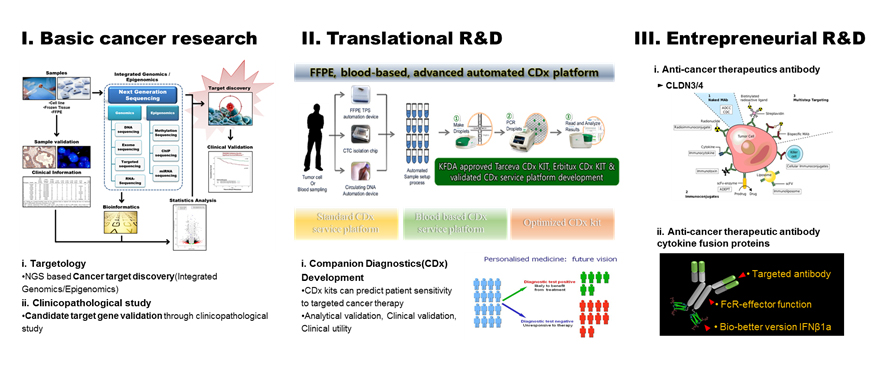Biomarker-based drug development, Antibody drug development
Prof. Young Kee Shin
Current Research Interests
- Validating biomarker candidates discovered by clinicopathological analysis and Next Generation Sequencing (NGS)
- Development of companion diagnostics (CDx) for precision medicine
- Development of novel therapeutic strategies for cancer and multiple sclerosis
Current Research Interests
1. Basic Cancer Research: Biomarker discovery (Targetology & Clinicopathology)
NGS is a recently developed technology widely used in the study of genetics/epigenetics that allows mass analysis of DNA sequences. The study of genetics/epigenetics is also important in the research of cancer pathogenesis. Our research group focuses on discovering new biomarkers combining information obtained from clinical data and genetic/epigenetic analysis of cancer samples using NGS technology. The validation of the newly discovered biomarkers by performing experiments in vitro/in vivo is also in process.
2. Translational R&D
Recently, research on precision medicine (drug safety, patient compliance, QoL etc.) has been widely performed. The development of companion diagnostics based on quantifiable and reproducible biomarkers will allow the prediction of patient groups by distinguishing responders (RP) from non-responders (NRP), and those who may have adverse effects. This will promise positive prognostics to the suited patient groups. We are currently researching on the analytical validation, clinical validation, and clinical utility of FFPE, CTC, and circulation DNA analysis in patient biopsy for the development of companion diagnostics platform.
3. Entrepreneurial R&D
Our lab is currently in the development of novel therapeutic strategies such as therapeutic antibodies and antibody cytokine fusion proteins for commercial use.
Anti-cancer therapeutic antibody: The development and licensing of a therapeutic antibody that specifically binds to the tight junction protein CLDN3/4, a therapeutic target in ovary cancer, and shows effector functions like ADCC, is in progress in cooperation with other research centers.
Antibody cytokine fusion protein: Antibody-cytokine fusion proteins (also known as immunocytokines) utilize tumor-targeting ability of monoclonal antibodies to carry cytokines specifically to tumor sites where they might stimulate an enhanced anti-tumor immune response while decreasing systemic toxicity. Recently, trial of commercializing the antibody cytokine conjugated protein is in process.
